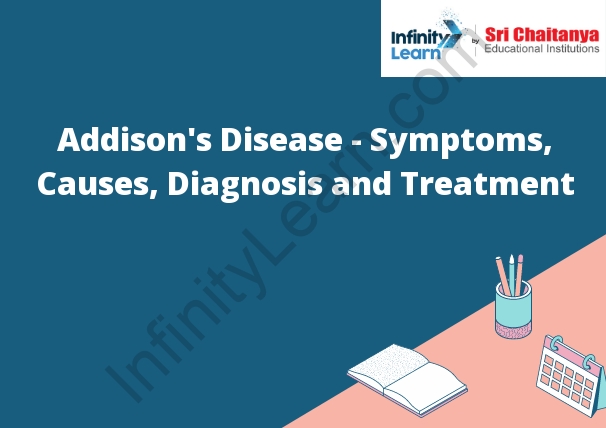Table of Contents
What is Addison’s Disease?
Addison’s disease is a rare, chronic, autoimmune disease that affects the adrenal glands. The adrenal glands are small, triangular-shaped glands that sit on top of the kidneys. The adrenal glands produce important hormones that help the body respond to stress and control blood pressure and blood sugar levels. In people with Addison’s disease, the adrenal glands do not produce enough of these hormones. This can lead to a range of symptoms, including fatigue, weight loss, low blood pressure, and changes in mood and personality.

Symptoms of Addison’s Disease
Addison’s disease is a hormonal disorder that results when the adrenal glands do not produce enough of the hormone cortisol. Cortisol is responsible for regulating the body’s response to stress, and people with Addison’s disease often feel tired and weak, and may experience changes in their mood or appetite. Other common symptoms include dizziness, low blood pressure, and muscle pain. In severe cases, Addison’s disease can cause coma or death.
Addison’s Disease Causes
The most common cause of Addison’s disease is an autoimmune disorder in which the body’s immune system attacks the adrenal glands. This can destroy the cells that produce hormones, including cortisol and aldosterone.
Other possible causes of Addison’s disease include:
-Infection
-Tumor
-Bleeding into the adrenal glands
– congenital adrenal hyperplasia (a genetic disorder that affects the adrenal glands)
Who is at Risk for Addison’s Disease?
People who are at risk for Addison’s disease include those with a family history of the disease, those with a history of autoimmune diseases, and those who have had surgery on their adrenal glands.
Diagnosing Addison’s Disease
Addison’s disease is a disorder that affects the adrenal glands. The adrenal glands are located just above the kidneys. They produce hormones that help control blood pressure, blood sugar levels, and the body’s response to stress.
If you have Addison’s disease, your adrenal glands do not produce enough of these hormones. This can cause a wide range of symptoms, such as fatigue, muscle weakness, nausea, and low blood pressure.
Addison’s disease is diagnosed with a blood test that measures the level of cortisol in your blood. Cortisol is a hormone produced by the adrenal glands. If your blood cortisol level is low, it may suggest that you have Addison’s disease.
Treatment for Addison’s disease includes taking supplemental hormones to replace the ones the adrenal glands are not producing.
Addison’s Disease Treatment
There is no one-size-fits-all approach to treating Addison’s disease, as the underlying cause of the condition and the severity of symptoms can vary from person to person. However, most treatments for Addison’s disease involve replacing the missing hormones that the body is not producing.
Some people with Addison’s disease may require lifelong hormone replacement therapy, while others may only need treatment for a short period of time. Treatment options include:
oral corticosteroids, such as hydrocortisone
glucocorticoid injections, such as cortisone
oral mineralocorticoids, such as fludrocortisone
Addison’s disease is a serious condition, and it is important to seek medical attention if you experience any of the symptoms.
Medications
that are used to prevent seizures are called antiepileptic drugs (AEDs). AEDs work by blocking the spread of seizure activity in the brain. There are many different AEDs available, and each one works a little bit differently. Your doctor will work with you to find the AED that works best for you.
Most people with seizures need to take AEDs every day to prevent seizures. AEDs can be taken by mouth (in pill form) or injected into a vein. Some people also need to use a special device to deliver AEDs directly to the brain.
AEDs can cause side effects. The most common side effects are dizziness, headache, and fatigue. These side effects usually go away over time. However, it is important to tell your doctor if you are having any problems with your AEDs. He or she may be able to adjust your dose or try a different AED.
Home Care
If you are a home care provider and are looking for more information, please visit the Home Care Association of America website.
The definition of home care is a range of health and social services that can be provided in a person’s home. These services can include personal care, such as help with bathing, dressing, and using the toilet; home management assistance, such as help with cleaning, laundry, and grocery shopping; and health care services, such as wound care or injections.
There are many benefits to receiving home care. First, home care allows people to stay in their own homes and maintain their independence. Second, home care is often less expensive than staying in a hospital or nursing home. Third, home care can be tailored to meet the individual’s specific needs. Finally, home care allows family members and friends to be involved in the care of their loved ones.
Despite the many benefits of home care, there are some drawbacks. First, not all home care services are covered by insurance. Second, not all home care services are available in every area. Third, some people may not be able to receive home care because they do not have a caregiver available to provide the necessary assistance. Finally, home care can be time-consuming and burdensome for family members and friends who provide the care.
Despite these drawbacks, home care is a valuable service that can benefit many people. I believe that home care should be available to everyone who needs it, and I am working to promote this goal.
Alternative Therapies
There is no one definitive answer to the question of what is the best treatment for cancer. Each person’s case is unique, and each person’s cancer is different. There are many different types of cancer, and each requires a different approach to treatment.
There are a variety of different alternative therapies that cancer patients may choose to explore. Some of these therapies include:
-Acupuncture
-Herbal remedies
-Naturopathy
-Osteopathy
-Reflexology
-Reiki
-Yoga









